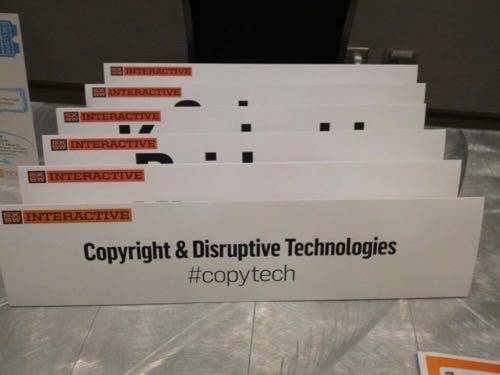
Copyright. Innovation. Free speech. These firestarting issues and the relationship between creation, law and technology were the topics in a Sunday panel that just may have been the sleeper hit of SXSW.
Speakers included Andrew Bridges, partner at Fenwick & West LLP, Margot Kaminski, the executive director at the Information Society Project at Yale Law School, Wendy Seltzer, policy counsel at the World Wide Web Consortium (W3C), Derek Khanna, a former Republican Study Committee staffer, and surprise guest Ben Huh, the chief executive of Cheezburger. All have been influential in speaking out against and litigating civil liberty cases pertaining to ACTA, SOPA and PIPA.
After the panel, ReadWrite spoke one-on-one with Bridges, whose 30-year career has included representing clients like Google and MasterCard in cases involving copyright, trademark and unfair competition. Bridges spoke on the lessons stemming from the hour-long panel:
ReadWrite: You have lots of criticisms of the copyright system. Can you explain your objections?
Andrew Bridges: Copyright is elevated to a level of importance in our society and our politics that it does not seem to deserve. If you actually took some copyright policies and extended them into other arenas, the consequences would seem absurd. Let’s say we decided to apply the Six Strikes principal. Say you send out one of those mailers for a subscription to Time Magazine. And you check the box that says bill me later. Let’s say that they start sending you Time Magazine, and after 2 or 3 issues they send you the bill, and you never pay. But in the meantime you have 6 or 8 issues before they cut you off for not paying. My proposal is let’s adopt Six Strikes and knock somebody off the postal system. You don’t pay for it, you don’t get to use the postal service any longer. Or let’s say somebody blows through a toll plaza 6 times, does that mean you don’t ever use the highways anymore? In the world of DMCA take-down notices, the copyright holder sends 6 wrongful take down notices, maybe they should lose access to the copyright system itself. Why is this limited to occasional, or amateur or individual persons who induce copyright infringement and why are they subjected to these type of penalties?

ReadWrite: How is copyright disruptive to technology?
Andrew Bridges: New technologies do disrupt existing business models. They do disrupt current expectations of profits and revenues. Actually copyright law itself has its own disruptive function. The function of copyright law as it has evolved is indeed to disrupt innovation and to disrupt new technologies that threaten the interest of copyright holders. Frankly all copyright legislation has been in reaction to new technologies that are developed. And copyright law has sought as its purpose, interfering with, limiting, pampering and indeed disrupting innovation of technology, business plans, even disruption of consumer choice.
ReadWrite: For example?
Andrew Bridges: It’s illegal to operate a business where you rent CDs out. Under copyright law, it’s illegal to watch on your DVD player, a DVD that a Greek friend of mine brings over as a present, because it has region coding. That’s a disruption of a user experience, by copyright law. We talk about disruptive technologies, but I think we’re talking about both disruptive technologies and disruptive law. I think if we have to look at rival disruptions, on the one hand [disruption] of business models and our expectations, and the other side [disruption] of technological developments and innovations and consumer choice, then I tend to cast my allegiance on the side of those who are disrupting older business models. That is how an economy grows, by creative disruption. That’s exactly how innovation enriches our culture and gives us the progress of science and the useful arts.
ReadWrite: How out of whack are the penalties for copyright violation?
Andrew Bridges: A woman in Minnesota got hit with a jury verdict of $1.5 million for downloads without any evidence that she actually shared anything with anybody else. That law allows statutory damages, which I call fictional damages because they [are] divorced from any proof whatsoever. The law allows fictional damages of $150,000 per work infringed. And that includes $0.99 downloads. So the ratio between penalty and loss revenue is excessive… 150,000 to 1. Let’s put copyright in the broader context. If I jump the turnstile of the New York City subway, If the copyright proportionality damages applies, it would be OK for that penalty fare to be $370,000. It’s as ridiculous in copyright law as it is in subway law.
ReadWrite: So who’s at fault here?
Andrew Bridges: People are focusing on Congress, [but] that’s misplaced… after SOPA. Because things don’t have to happen in Congress for bad things to go off. Even though SOPA failed, SOPA is now in some respects the law of the land. Because we now have Soft SOPA. We have the government putting pressure on advertising networks and putting pressure on payment processors, unofficially, to take the same measures that SOPA was going to require them to [do]. But now it’s a sort of ‘if you know what’s good for you, could you pretty please, wink-wink’ method.
ReadWrite: Can you give an example of that pressure?
Andrew Bridges: There are payment processors notifying companies that they are no longer willing to process payments for them. It’s happening. It happened with three of my clients. It’s part of what the administration calls its ‘voluntary cooperation initiative,’ which the Intellectual Property Enforcement Coordinator Victoria Espinel describes in her annual report. And we have advertisers blacklisting certain sites, and telling sites. ‘We’re not going to place advertising on your site because people tell us you’re not a good site.’ So that’s happening. And it’s being done as “Oh it’s just a private decision.” But it’s no secret that the government is encouraging these private decisions. So that’s why I call it Soft SOPA.
Photo courtesy of Wendy Seltzer.

















